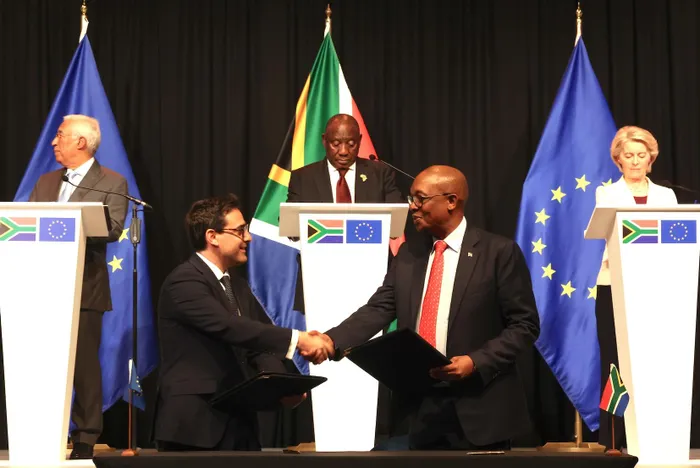South Africa pushes clean industrialisation, EV transition in talks with G20 partners
G20

Minister Parks Tau, Minister of Trade, Industry and Competition, and Stéphane Séjourné, Executive Vice-President for Prosperity and Industrial Strategy of the European Commission, signed the Memorandum of Understanding on the Clean Trade and Investment Partnership.
Image: Supplied/GCIS
South Africa is using its hosting of the G20 Leaders' Summit in Johannesburg this week to push for deeper partnerships on clean industrialisation, energy transition, and the rapid scaling-up of electric vehicle (EV) production, according to the Ministry of Trade, Industry and Competition (the stic).
Speaking on the sidelines of the Summit, the dtic spokesperson Kaamil Ali said Pretoria is prioritising trade and industrial development within the G20 agenda, with a specific focus on ensuring that African countries benefit from the global shift toward green technologies.
Ali said South Africa and the broader continent hold many of the critical minerals needed for renewable energy and EV manufacturing, but government is determined to move beyond simply exporting raw materials.
“We don't want to export rock, soil and dust. We want to create value, adhere as close to source or at source of extraction of these minerals,” Ali said.
Responding to questions about South Africa’s long-awaited EV policy, Ali confirmed that the policy paper has been adopted, with a March 2026 rollout date. He said the dtic and the National Treasury are finalising a new incentive framework to accelerate EV manufacturing locally.
The urgency comes as the European Union — one of South Africa’s biggest export markets — moves toward phasing out internal combustion engine vehicles.
Auto manufacturers such as BMW South Africa have reaffirmed their commitment to driving the country’s automotive sector into an electrified future — even as policy uncertainty threatens to slow down momentum across the industry.
“We know that the European Union is one of our biggest markets in terms of vehicles, (1:05) but we also know that they have a cut-off date wherein they are saying they will no longer be allowing the engine combustion vehicles,” Ali said.
“We view the auto sector as a critical lever to accelerate our decarbonization efforts. The world is changing its policies, particularly the EU, which is a huge export market for our auto sector. The EV policy paper was adopted and it speaks about a March 2026 rollout date.”
South Africa is also eyeing greater penetration into the African EV market, which Ali described as a major untapped opportunity.
Ali added that the EV transition is tightly linked to the country’s energy and industrialisation pillars under its G20 theme of sustainability.
"Linked to that is the pillar of sustainability within our G20 theme that we've adopted.And linked to that is our industrial policy pillar, which focuses on decarbonization. So we are committed to that date where we'll be creating an incentive scheme between us and the National Treasury around electric vehicles," he said.
"But also linked to that will be obviously the energy inputs into those electric vehicles, component manufacturing into electric vehicles. So we are talking to a number of players around the world, including the Europeans, on how we can accelerate that work."
Ahead of the Summit’s formal sessions, Minister of Trade Parks Tau has held a series of bilateral meetings aimed at strengthening cooperation on industrialisation and climate-linked technologies.
Ali confirmed that South Africa has just signed a Memorandum of Cooperation with Japan on decarbonisation, which will include collaboration on the auto sector, as well as carbon capture and reuse technologies.
“We are a coal-dependent economy and we realize that our emissions are quite high, but there's a way to transition away from those high emissions using carbon capture technology.And the Japanese are a great partner in that,” Ali said.
Ali also noted recent engagements with Egypt and Algeria on developing an African auto pact to deepen continental value chains under the African Continental Free Trade Area (AfCFTA).
“Minister Parks Tau has been very aggressive in this because as a really big economy on the African continent, Egypt plays a critical role in this,” Ali said.
“So together with Algeria and Egypt, how do we create value systems along the value chain in the auto sector between these big economies on the African continent, accelerating the use of the AfCFTA and the recently adopted protocols at the Ministry of Economy.”
With world leaders gathered in Johannesburg, South Africa expects the Summit to help cement these partnerships and advance its vision for clean industrial growth.
Ali concluded: “This is a major opportunity to lock in cooperation before the formal sessions even begin. And the minister has been very aggressive in ensuring we take full advantage of it.”